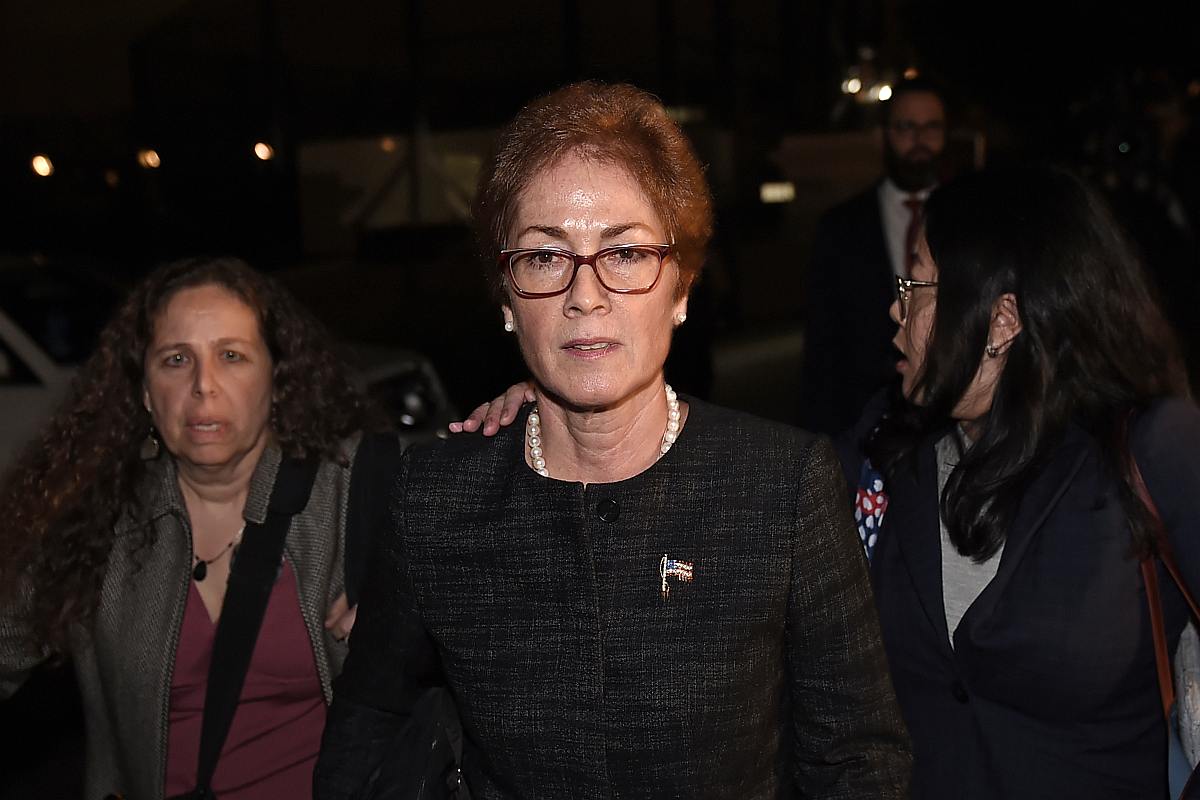Trump asks Putin to spare the lives of Ukrainian troops
US President Donald Trump said he had appealed to Russian President Vladimir Putin that the lives of thousands of Ukrainian troops “completely surrounded” by the Russian military be “spared”.”
Former Ukraine envoy Marie Yovanovitch, known for her staunch ant-corruption stance told the Congressional investigators that she discovered in late 2018 that Trump’s personal lawyer Rudy Giuliani was trying to sabotage her reputation.

Former US Ambassador to Ukraine Marie Yovanovitch (C) flanked by lawyers, aides and Capitol police, leaves the US Capitol October 11, 2019 in Washington, DC after testifying behind closed doors to the House Intelligence, Foreign Affairs and Oversight committees as part of the ongoing impeachment investigation against President Donald Trump. (Photo by Olivier Douliery / AFP)
The ongoing impeachment inquiry against US President Donald Trump revealed shock and concern as two senior diplomats testified in front of House committees whose transcripts were released on Monday.
Former Ukraine envoy Marie Yovanovitch, known for her staunch ant-corruption stance told the Congressional investigators that she discovered in late 2018 that Trump’s personal lawyer Rudy Giuliani was trying to sabotage her reputation.
Advertisement
In her statement Yovanovitch said, she remained worried that she would be a target of retaliation by Trump, who referred to her in his July 25 phone call with Ukraine’s President Volodymyr Zelenskiy, as “bad news” and someone who was “going to go through some things.”
Advertisement
“I was very concerned” upon reading Trump’s words when the rough transcript of the call was released, Yovanovitch testified. “I still am.” Asked whether she felt threatened, she replied, “Yes.”
When Yovanovitch sought the advice of Gordon Sondland, US ambassador to the European Union, he said, “You need to, you know, tweet out there that you support the president.”
“He said: ‘You know the president. Well, maybe you don’t know him personally, but you know, you know, the sorts of things that he likes. You know, go out there battling aggressively and, you know, praise him or support him.’”
The second diplomat, P Michael McKinley, described how his awareness of the White House plot to attack Democrat Joe Biden, combined with the failure of the state department to support Yovanovitch, led him to resign. “To see the emerging information on the engagement of our missions to procure negative political information for domestic purposes,” McKinley testified, “combined with the failure I saw in the building to provide support for our professional cadre in a particularly trying time, I think the combination was a pretty good reason to decide … I had no longer a useful role to play.”
Yovanovitch’s statement describes the involvement of Rudy Giuliani, Trump’s personal attorney, in the early stages of what became a coordinated campaign to coerce the new leader of Ukraine to investigate Trump’s political opponents in a quid pro quo case.
The Washington Post report also says, McKinley had raised the idea of issuing a public statement in support of the Ukraine ambassador directly with Secretary of State Mike Pompeo on September 26 after the release of the Trump-Zelensky transcript but that Pompeo did not respond to the suggestion. Two days later, McKinley emailed other senior officials, proposing a “strong and immediate statement of support for Ambassador Yovanovitch’s professionalism and courage.” A few hours later, one of the recipients of McKinley’s email, a State Department spokesman, called to say that Pompeo had rejected the idea, citing a desire to protect Yovanovitch from “undue attention.” This stance led to McKinley’s resignation.
As Democrats unveil a new, public phase of the probe, they released the full transcript of the deposition of former ambassador Marie Yovanovitch, who testified last month that she was ousted over “false claims” spread by questionable actors allied to Trump.
The House of Representatives voted on Thursday to formalize impeachment proceedings against the president who in turn called for the unmasking of the anonymous whistleblower on Sunday, whose complaint launched the House impeachment investigation. Trump’s demand, in a tweet, comes amid an intensifying effort by Republican lawmakers to expose the whistleblower and attack his or her credibility.
Advertisement